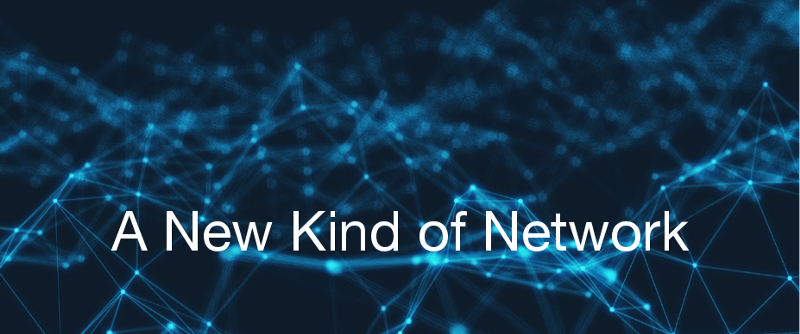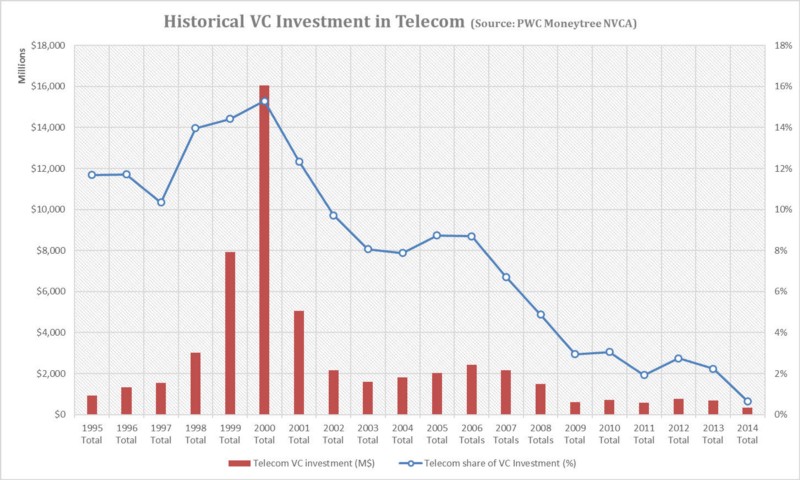Seeking innovation in the telecom industry and why I co-founded NKN.org ( originally published on LinkedIn Pulse )

When I was in graduate school, Turbo Code was the obsession of my day since it can decode the weakest and most garbled radio signals. Fast forward to 2018, Yanbo and I founded the “New Kind of Network” project that intend to use blockchain technology and business model to disrupt the telecom business. The journey was long and tenuous, but the progression seems inevitable.
The many challenges of telecom industry
The telecom industry has made strides in advancing the technology, which is powering our mobile lifestyle and the new digital economy. However, as I blogged in “5G: a Groundhog Day movie?”, innovation in telecom is slowly dying if you look at the Venture Capital investment in this segment. The percentage share of Telecom Industry in total VC investment had a even more drastic decline of from 8.7% in 2005 to 0.6% in 2014.

Furthermore, we see the following warning trends
- Increasing fragmentation of the Internet itself where many users cannot access large portion of the Internet servers and services.
- Network Neutrality rules is being repealed, major carriers seem to have even more power than before in deciding how to “differentiate” the application they carry.
- Due to the consolidation of telecom carriers, users seem to have less and less choices either in home Internet connection or wireless subscription.
The lessons from “Muni WiFi”
During 2005–2007, there was a “Muni WiFi” movement in US and Europe where municipality or government try to deploy city wide WiFi network as alternative to monopolistic commercial ISPs. Jan Berglund and I co-founded WiMetro venture inside Nokia to address this opportunity, where Yanbo was a tech lead for the WiFi software stack. But as the movement withered away due to carrier lawsuits and municipal budget cuts, we learned a few things:
- WiFi and unlicensed technology will have profound impact on the whole telecom industry. It enabled permissionless innovation by a large and open ecosystem, where not only new technology can leapfrog state of art cellular system (OFDM, MIMO, Carrier Aggregation), but also major new companies can emerge and become successful (Atheros, Meraki, Aruba).
- Communication network is fundamentally decentralized and peer to peer . We can see this even more clearly today that people spend majority of their activities on messaging apps such as WeChat, WhatsApp, or Facebook Messenger. In addition, content creation and consumption are increasingly peer to peer instead of broadcast.
- We cannot rely on government for either timely and wise regulation or funding innovation.
Enter blockchain and New Kind of Network
When I wrote in another blog “5G: an Uberized Edition”, I proposed to “ uberize resources ” and “ consumer becomes producer ”. But I was struggling with one big question: who can become that centralized bandwidth exchange which handles millions of micro-payments for billions of users. At that time, only the big five web scale companies such as Google and Facebook seem to fit the bill.
That’s why I was instantly intrigued about the prospect of applying token economy model to the telecom industry, when Yanbo introduced blockchain technology to me. The three core tenets of public blockchain: decentralized, censorship-resistant, permissionless , seems to address most of the shortcomings we learned from the “Muni WiFi” experiment. And best of all, gasp, we don’t need that centralized and trusted party.
The New Kind of Network need to innovate on three layers of the stack:
- Tokenizing resource : how can we incentivize users to share their connectivity and bandwidth, help record and verify the transactions, and further expand and build out new network infrastructure?
- Network routing : how can every node in the network be able to relay traffic for other nodes, while providing efficiency and security?
- Consensus : in order to support mobile devices and even IoT devices, how can we reach consensus for billions of nodes? As reference, the current state of art consensus algorithms for Bitcoin and Ethereum can only scale to a few hundred or a few thousand nodes
Looking back to the Turbo Code days, life is much simpler because it is purely technology. With blockchain, the line is blurred between technology and business model innovation. But to paraphrase the Star Wars movie, The New Kind of Network might well be the telecom industry’s New Hope . Please join us!
Footnote 1:
There are some spiritual similarity between Turbo Code and Cellular Automata (one of the core concepts in the nkn.org project). Two things made Turbo Code successful: the code’s random appearance on the channel together with the physically realisable decoding structure. Cellular Automata (CA) matches both brilliantly when applied to either dynamic routing or consensus algorithms: the phase “Edge of Chaos” maps to the randomness in dynamic routing; while the simple rules of CA makes such protocol very straightforward to implement even on mobile or IoT devices.
Footnote 2:
There are uncanny resemblance of NKN project to the Piped Piper’s “New Internet” in recent HBO “Silicon Valley” TV episodes. But that will be flattering ourselves. I believe the story is loosely based on ipfs/filecoin , a project out of Stanford alumni focusing on decentralized storage. NKN.org is working on the networking pillar, as opposed to the computing or storage pillars.
